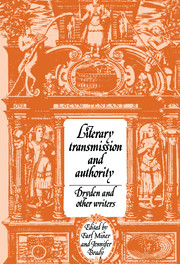Book contents
- Frontmatter
- Contents
- Contributing authors
- Preface
- Acknowledgments
- Introduction: borrowed plumage, varied umbrage
- 1 Dryden and negotiations of literary succession and precession
- 2 Onely victory in him: the imperial Dryden
- 3 Ovid reformed: issues of Ovid, fables, morals, and the second epic in Fables Ancient and Modern
- 4 Another and the same: Johnson's Dryden
- Index
Introduction: borrowed plumage, varied umbrage
Published online by Cambridge University Press: 19 January 2010
- Frontmatter
- Contents
- Contributing authors
- Preface
- Acknowledgments
- Introduction: borrowed plumage, varied umbrage
- 1 Dryden and negotiations of literary succession and precession
- 2 Onely victory in him: the imperial Dryden
- 3 Ovid reformed: issues of Ovid, fables, morals, and the second epic in Fables Ancient and Modern
- 4 Another and the same: Johnson's Dryden
- Index
Summary
One of the rewards of reading Dryden's literary and critical writings – and one of the problems in teaching them – is the rich sense one obtains of his engagement with those who have mattered, and have continued to matter, in western culture. In a rapid survey of the index to George Watson's two-volume Everyman selection of Dryden's critical writings, one discovers about 130 references to English writers, almost a hundred to Graeco-Roman writers, some eighty-five to postclassical European writers, and a couple of dozen to non-literary artists. There is no precedent for such engagement, and who among us can name half the Graeco-Roman writers or half the British writers before Dryden whom he not only names but engages with? The surprising thing about the subject of Dryden's claim as authority and transmitter is that it has not been made, long ago, the explicit object of critical attention, much less a model of how writers conduct themselves in engaging with predecessors and contemporaries.
If not explicit or the basis of a model, the subject has necessarily arisen for nearly every critic of Dryden in some more or less tacit or practical fashion. The interfusion of literature, religion, politics, social organization, and economics in the century made proper authority a revolutionary issue of the state of letters as well as politics. Transmission was not play, but engagement with predecessors and contemporaries inevitable to any serious writer. In one mood, Donne could make “one little room an everywhere,” but even for his awakening lovers the interest lay in finding the macrocosm in the human microcosm, the world in the bed – if not tossed in Robert Burton's blanket.
- Type
- Chapter
- Information
- Literary Transmission and AuthorityDryden and Other Writers, pp. 1 - 26Publisher: Cambridge University PressPrint publication year: 1993

